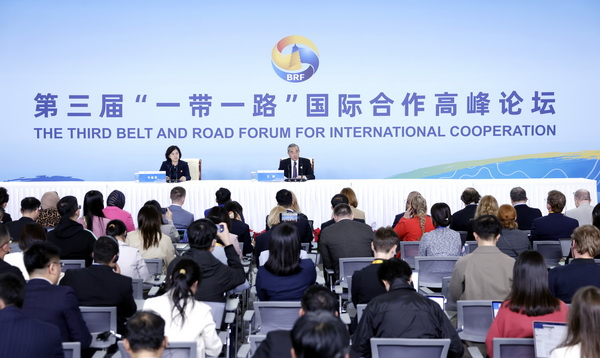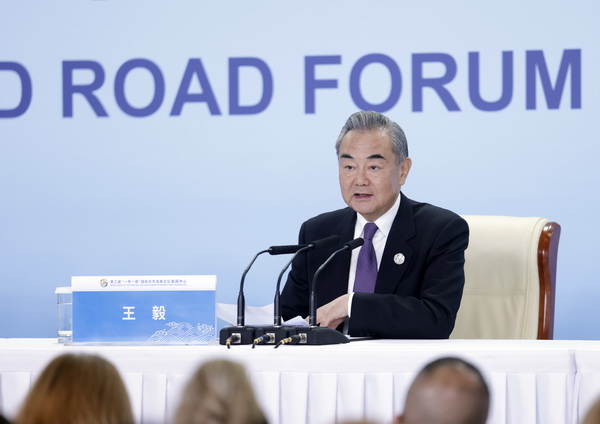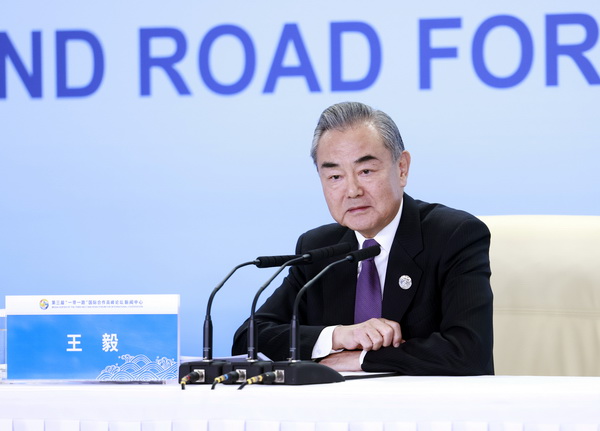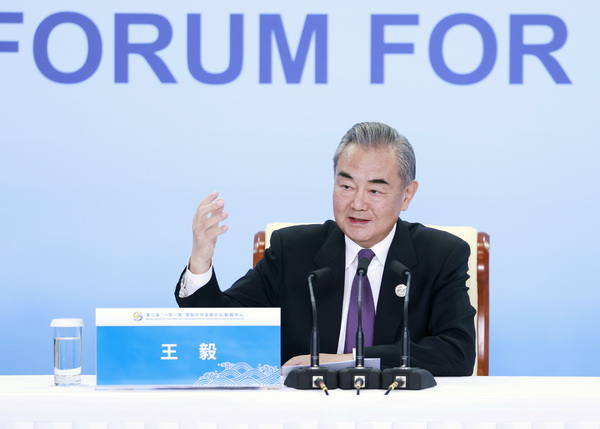
On October 18, 2023, as the third Belt and Road Forum for International Cooperation (BRF) came to a conclusion, Member of the Political Bureau of the CPC Central Committee and Foreign Minister Wang Yi held a press conference for Chinese and foreign media at the press center of the Forum, introducing the important outcomes of the Forum and answering questions.
Wang Yi said that the past decade has witnessed historic achievements in Belt and Road cooperation. A path of cooperation, opportunity and prosperity that leads to common development has been found. Benefiting over 150 countries, the Belt and Road Initiative (BRI) has become the most popular international public good and largest international cooperation platform in today's world. This BRF was attended by over 10,000 registered representatives from 151 countries and 41 international organizations. The scale of participation has once again showcased the tremendous appeal and global influence of Belt and Road cooperation.
Wang Yi said, "President Xi Jinping delivered a keynote speech at the BRF opening ceremony. Reviewing the achievements and successful experience of the past ten years, he emphasized that Belt and Road cooperation is on the right side of history, keeps pace with the advance of our times, and represents the right path forward. He announced eight major steps China will take to support high-quality Belt and Road cooperation, setting a new direction, opening new vistas and generating new momentum for the BRI. He is expected to hold meetings or talks with all foreign leaders attending the BRF and reach a wide range of important cooperation consensus."

Wang Yi pointed out that the BRF has achieved great success. The participating parties agree that it is another important milestone in the process of Belt and Road cooperation. It is a conference of unity that has further consolidated the consensus on Belt and Road cooperation, a conference of win-win outcome that has further enriched Belt and Road cooperation, and a conference of development that has broadened the bright prospects of Belt and Road cooperation. Wang Yi highlighted the important consensus and outcomes reached by the participating parties.
First, the clearest message from this Forum is unity, cooperation, openness and win-win outcome. Today's world is confronted with a multitude of crises and challenges; Cold War mentality and bloc confrontation have resurfaced. Yet all the participants have made it clear that they have come for friendship, for cooperation and for development. President Xi Jinping pointed out in his keynote speech that humankind is a community with a shared future; win-win cooperation is the sure way to success in launching major initiatives that benefit all; and the Silk Road spirit of peace and cooperation, openness and inclusiveness, mutual learning and mutual benefit is the most important source of strength for Belt and Road cooperation.
Wang Yi said, "From Beijing, a clear and unambiguous message has been sent to the world, that is, we need unity, cooperation, openness and win-win outcomes, not division, confrontation, isolation or zero-sum mentality. Amidst great transformations unseen in a century, Belt and Road cooperation will always bring stability and positive energy to the world."
Second, the most important consensus of this Forum is to usher in a new stage of high-quality Belt and Road cooperation. President Xi Jinping noted that China will work with all parties involved to deepen Belt and Road partnerships of cooperation, and usher this cooperation into a new stage of high-quality development. These words have received positive response and support from all parties.
At the High-Level Forum on Connectivity in an Open World Economy, the participants supported efforts to further boost connectivity; build high-quality, sustainable and resilient infrastructure; enhance cooperation in such areas as transportation, energy, resources and irrigation; steadily increase institutional connectivity in infrastructure; and build an open world economy.
At the High-Level Forum on Digital Economy as a New Source of Growth, the participants called for expedited efforts to build a Digital Silk Road; fostering an open, fair, and non-discriminatory environment for digital development; promoting deep integration of digital technologies and the real economy; and advancing the healthy, orderly and secure development of artificial intelligence (AI). To that end, China has put forward a Global Initiative for AI Governance, which has drawn great attention.
At the High-Level Forum on Green Silk Road for Harmony with Nature, the participants highlighted the need to further build the Green Silk Road, meet the climate challenges together, step up cooperation on biodiversity protection, build investment and financing partnerships for green development, and empower green development.
At the thematic forums, the participants shared their desire to fully advance practical cooperation, boost trade and investment liberalization and facilitation, improve the business environment, support the development of the blue economy, build a clean Silk Road, deepen subnational exchanges, and carry out a variety of cultural, educational, sci-tech, tourism, health and sports activities.

Third, the most ambitious vision of this Forum is to realize global modernization through joint efforts. Realizing modernization is the common aspiration and due right of all peoples. The BRI offers a cooperation platform for common development and helps many developing countries accelerate their pace toward modernization. President Xi Jinping proposed for the first time that global modernization should be pursued through the joint efforts of all countries to enhance peaceful development and mutually beneficial cooperation and bring prosperity to all. This ambitious goal is consistent with China's vision of building a community with a shared future for mankind, and sets the direction for high-quality Belt and Road cooperation. People around the world realizing modernization together will be a most magnificent endeavor in human history.
President Xi Jinping pointed out that the modernization China pursues is not for the country alone, but for all developing countries through joint efforts. He announced at the opening ceremony that China will further expand market access; deepen reform in areas including the state-owned enterprises, digital economy, intellectual property and government procurement; and enter into free trade agreements and investment protection treaties with more countries. China's potential as the world's largest market will be continuously tapped. Chinese financial institutions will set up new RMB financing windows and support BRI projects based on well-informed studies. China will promote local employment through cooperation projects and carry out 1,000 small-scale livelihood assistance projects. China believes that the materialization of these significant measures will surely provide stronger boost and greater space for global modernization.
Fourth, the defining feature of this Forum is that it is action-oriented, efficient and pragmatic. To advance Belt and Road cooperation, it is necessary to build consensus for collaboration and, more importantly, take concrete actions. President Xi Jinping announced in his keynote speech eight major steps China will take to support high-quality Belt and Road cooperation. These include steps to build a multidimensional Belt and Road connectivity network, promote green development, and advance scientific and technological innovation. They also include specific projects of practical cooperation, people-to-people exchanges, and institution-building for Belt and Road cooperation.
During this BRF, 458 outcomes have been reached, far exceeding the number of the last Forum. They include important cooperation initiatives and institutional arrangements such as the Beijing Initiative for Deepening Cooperation on Connectivity, the Beijing Initiative for Belt and Road Green Development, the Beijing Initiative on the Belt and Road International Digital Economy Cooperation, the Green Investment and Finance Partnership, and High-Level Principles on Belt and Road Integrity Building. They also include specific targets including providing 100,000 training opportunities on green development for partner countries by 2030, and increasing the number of joint laboratories to 100. Commercial agreements worth 97.2 billion U.S. dollars have been concluded at the CEO Conference, which will help generate jobs and growth in relevant countries. The Forum also decided to establish a BRF secretariat to facilitate institution-building and project implementation. These tangible cooperation outcomes are a vote of support and confidence in BRI by participating parties. Belt and Road cooperation is not about high-sounding rhetoric, but about concrete action. It will certainly provide sustained impetus for global growth and common development across the world.

Wang Yi stressed, as a Chinese saying goes, "When everybody brings firewood, the flame will be higher." The success of the BRF proves once again that China has followed the right direction in advancing Belt and Road cooperation, that BRI partners have shown firm commitment to participation, and that high-quality Belt and Road cooperation enjoys bright prospects. The BRF also proves that peaceful development and win-win cooperation represents the prevailing trend and people's common aspiration. Cold War-style confrontation and decoupling efforts go against the tide of history and will lead nowhere. Wang Yi concluded, "Standing at a new historical starting point, we look forward to working with all parties to carry forward the Silk Road spirit, embark on a new journey of Belt and Road cooperation, and usher in a better future of joint progress toward global modernization."

 中文
中文 English
English